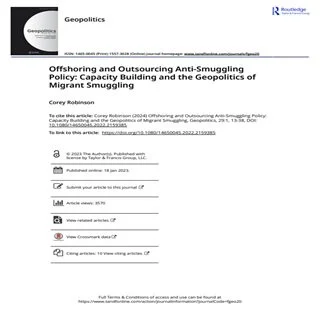By Corey Robinson
Using an analytic of problematisation that incorporates insights from governmentality studies and migration studies, this article documents and conceptualises the role of capacity building in the offshoring and outsourcing of Canada’s anti-smuggling policy. I examine the problematisation of migrant smuggling in interviews, access to information requests and publicly available texts to show how, why and with what effects, the Canadian government, in collaboration with UN agencies, engaged in capacity building across Southeast Asia and West Africa to combat migrant smuggling and interdict migrant vessels before they departed for Canada. I argue that under the technocratic banner of capacity building, anti-smuggling policy constitutes migrant smuggling as an object of discourse. Anti-smuggling policy, I contend, frames, rationalises and obscures the interdiction of refugees and the externalisation of protection as politically neutral, technocratic efforts to build capacity to combat migrant smuggling. Though capacity building may include apparently positive measures to enhance international cooperation, if it frustrates access to asylum, as this article suggests, it can be said to externalise international protection responsibilities, contrary to the principles outlined in the Global Compact for Safe, Orderly and Regular Migration and the Global Compact on Refugees.
Geopolitics, 29(1), 13–38



